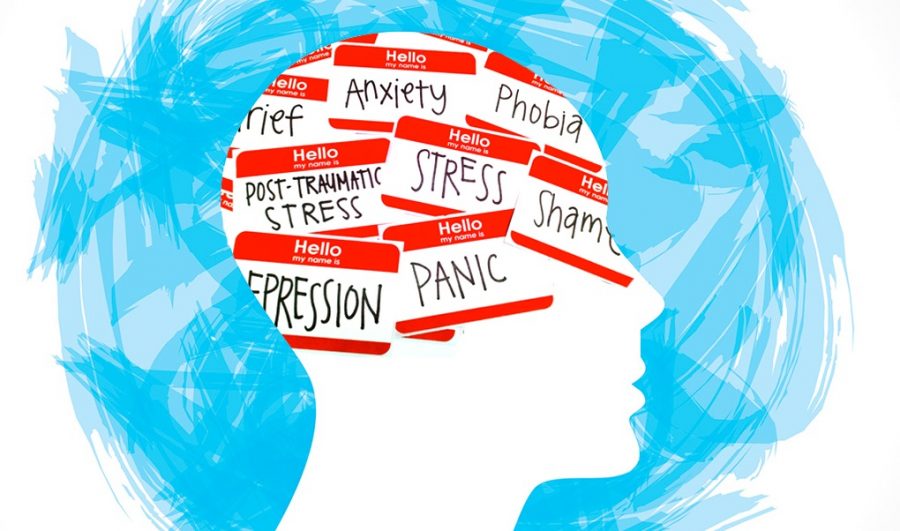Mental health stigma needs to end
Mental Health Awareness month may have ended, but the need to end stigma against people who suffer from mental health issues persists
June 9, 2021
May is Mental Health Awareness Month. Mental health is a person’s emotional, social and psychological well-being, and affects how we think, feel and act throughout the entirety of our lives. Even though millions of Americans live with a mental illness, mental health continues to be one of the most stigmatized conditions.
Stigma is a negative attitude against someone based on a characteristic. The stigma surrounding mental health leads to the majority of people living with mental illnesses not receiving help. According to the American Psychiatric Association, there are three types of stigma. Public stigma is the discriminative attitude of other people. Public stigma can even show up in television shows when mentally ill characters are cast as a stereotype (violent or unpredictable, for example). Self-stigma is internalized shame about someone’s own condition, such as thinking they are overdramatic or attention-seeking. Institutional stigma is systematic and can limit opportunities for people. Systematic stigma could be the way the police respond to mental health crises. Public stigma can induce self-stigma, such as the representation of mental illness in the media. When someone is stigmatized against themselves, it lowers their hope and their self-esteem.
It all starts with people’s perception of those living with mental illness. Sydney Hammond, a sophomore at Shawnee, said, “Stigma is why the mentally ill can be considered lazy, dramatic or even unstable and dangerous. These untrue negative stereotypes undermine and isolate those who may have trouble getting help due to fear of social backlash.”
There is sometimes a common misconception that mental illness means someone is more prone to be violent or less productive at work. After hearing these stereotypes, someone with a mental illness is more afraid to speak up in fear that they will be labelled that way too. The cycle starts with the public stigmatizing those with mental health problems and in turn, those with mental health problems stigmatize their condition.
A mental illness does not inherently mean someone is violent. Mental Health states, “In fact, people with severe mental illnesses are over 10 times more likely to be victims of violent crime than the general population.” Sometimes a mental illness can lead to violence, but this is rarer than people would think. When watching a movie like “Joker” or a show like “Criminal Minds,” there are people with mental health problems who become violent. However, this is the exception, not the rule. Most people with mental illnesses would be more likely to be a victim rather than the perpetrator.
Something people do not realize is the numbers of people in their life that may have mental health problems, even if they do not show it in the way the stigmatized view expects. Even with a mental illness, many people are capable of functioning.
“Employers who hire people with mental health problems report good attendance and punctuality as well as motivation, good work, and job tenure on par with or greater than other employees,” said Mental Health. People who think of someone with mental illness might first think of the stigmatized view: someone lazy. In reality, there are different kinds of mental illness and some of them, like anxiety, might push people to succeed. Just because someone is depressed does not mean they will not be a good worker. There are different severity levels of all types of mental illnesses and not all symptoms are present consistently.
A lot of self-stigma stems from someone who is diagnosed believing there is no recovery for themselves. Mental Health states, “Studies show that people with mental health problems get better and many recover completely. Recovery refers to the process in which people are able to live, work, learn, and participate fully in their communities. There are more treatments, services, and community support systems than ever before, and they work.” Someone with mental health problems may spiral into the idea of hopelessness and embarrassment, but there is hope for everyone. For some people, the avenues of support are harder to reach or even impossible at times due to factors including family, money, and more.
However, recovery from a mental illness like anxiety doesn’t mean you are completely better; instead, it is a matter of being able to cope with everyday life. There are even apps designed to help people who may otherwise not have a support system. This is not meant to degrade the difficulty of recovery, because it is one of the hardest things you can do; it is just to say that there is hope. If you have mental health problems and have the opportunity to go to therapy, it is worth it to try to work on your coping skills, triggers, and your mentality. Even if you do not have mental health problems, therapy can be for everyone. Something you consider small, like the daily stress of life or trying to balance everything, is valid to go to therapy. Wanting a little extra help shouldn’t be a source of shame and self-stigma; it should be encouraged. No one should have to be alone in their struggles if they don’t have to be.
One of the biggest struggles in modern society with mental health stigma may be the jokes made regarding the topic. “Personally I believe the stigma against mental health isn’t necessarily that there is no recovery, but more the fact that it is a ‘trend’ or something to make a mockery of. Mental health is a serious subject that should be taught about and taken seriously,” said Kiley Miller, a sophomore at RV.
As society progresses, the stigma changes too. While some people might now be able to accept that mental illness exists, they may not take it seriously. People joke about being depressed or having crippling anxiety, regardless of if they are diagnosed and what they are talking about. (for example: saying they are depressed because of a test score) The jokes about mental illness only continue the stigma cycle.
When people make jokes that mix up sadness and depression, as well as stress and anxiety, people who are suffering become afraid to speak up. It makes their problems feel less valid and they don’t want to be labelled as a trend. Making jokes to cope when you are diagnosed is one thing, but the jokes have become trends in the media where no one can tell who is serious. Some people may not have the means to become diagnosed, but if they think they have a mental illness they should talk about it seriously as a concern rather than making jokes. Talking is important, but if jokes are made it takes away the power of it.
These jokes and social media trends romanticize mental illness. “In some cases, mental health is romanticized and not taken seriously which is uncalled for,” said sophomore Natalie Swan. “Jokes or insensitive comments about serious mental illness or an individual who has a mental illness or disorder is just gross.”
People post jokes about mental illness, such as calling dying their hair a mental breakdown. WebMD defines a mental breakdown as, “a period of extreme mental or emotional stress. The stress is so great that the person is unable to perform normal day-to-day activities.” When people make jokes about it, they take away validity from people who are suffering. When someone finally does speak out about their symptoms or mental illness, people take it as a trend because it has become so romanticized. People talk about their symptoms and people laugh and agree. To clarify, you should talk about your problems if you need to; just don’t make a joke about something like mental breakdowns if that is not what you are experiencing.
Stigma against mental illness needs to stop and there are several steps to doing so according to the American Psychiatric Association. Talk openly about mental health, such as on social media. When doing so, make sure to take it seriously. Educate both yourself and others. When people make misperceptions, correct them. Be conscious of your language, such as calling someone psychotic. Encourage physical and mental illness to be equal. Show compassion for those living with mental illness and if you are living with one, be honest about your treatment (if you feel comfortable). Mental health stigma only continues from people hiding it from shame, so if you are willing to get out of your comfort zone to educate others, share your story. There is no need to feel shame.
A mental illness is as valid as a physical one. Choose empowerment. Who you have been in the past does not define you, and neither does who you are now. Look to the future to improve. If you have used stigmatized language against those living with mental illnesses, now is the time to change it. People with mental health problems are struggling, but there is an opportunity for everyone to be okay. Progress takes time and shame has no role in it.







